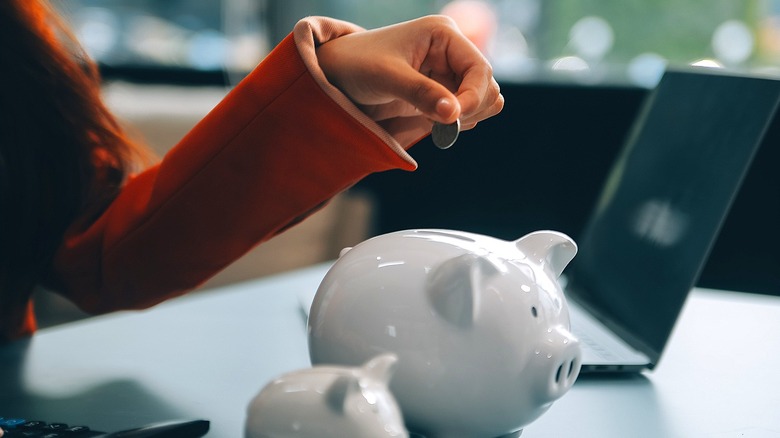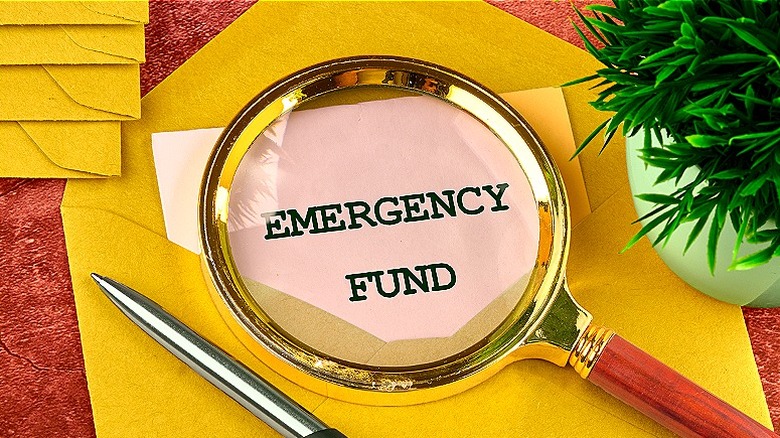Clear Signs You May Have Too Much Money In Your Checking Account
Having too much money in your bank account might sound like a problem that many of us would like to have. However, if you're simply letting unspent funds from your paychecks or other income build up in your regular checking account, then you're missing out on growing that money. Receiving interest payments and gains from a rising stock market can help (at a minimum), keep pace with inflation, and protect your spending power.
Of course, checking accounts are insured by the Federal Deposit Insurance Corporation (or FDIC), up to $250,000 per account holder, so your money is safe against the rare instance of bank failure. But the bad news is that many checking accounts don't pay any interest whatsoever. And those that do have very low rates, like 0.50% or less. After all, checking accounts are designed to give you easy access to your money for paying bills, effortlessly withdrawing cash via ATMs, and more recently, peer-to-peer payments. However, you should only keep enough money in your checking account to pay for a couple months' worth of living expenses, or you will literally be leaving money on the proverbial table.
Several months of living expenses are available
For everyday expenses as well as emergencies, it only stands to reason you'll want easy access to your hard-earned cash. If you've managed to build up three to six months' worth of expenses in an emergency fund, that's great. But at the same time, you'll want that money earning interest, not sitting idle in a checking account, which offers no or low yield. On the other hand, you might not want to tie your money up indefinitely, either; for example, by opening a certificate of deposit account with a maturity date several years in the future. In that case, you wouldn't be able to access your funds, if needed, without likely paying a penalty.
Instead, consider keeping two months' worth of living expenses in your checking account, and opening a still-liquid high-yield savings account with the rest. In spite of a recent Federal Reserve rate cut, the most attractive savings accounts still pay more than 4% annual percentage yield (APY), with the top contenders paying about 5%. That's more than 10 times what many interest-bearing checking accounts pay, if they pay interest at all.
With an account balance of $20,000 and an APY of 5%, you'd have a cool $21,000 after just one year. That is $1,000 in risk-free return. That said, you might have to do a little online sleuthing to locate the very best rates, because it's unlikely that your local bank or credit union will offer such aggressive yields.
You're not investing for retirement
Another sign that your excess cash is being misallocated in a checking account is if you have little or no money invested for retirement. Although opening a high-yield savings account is better than nothing, the average return for the S&P 500 has been ~10% per year since 1957, when the index was founded. With the effect of compounded gains over a long period of time, money invested now could grow considerably by the time you are ready to stop working.
It's especially important to divert some of your free cash into a retirement fund if your employer makes a matching 401(k) contribution as part of your overall compensation package. This matching offer could amount to several thousand dollars per year of free money contributed into your future retirement savings from your employer, but only if you contribute to your account likewise (not maximizing this company match is a common 401(k) mistake, by the way).
Granted, funds in a retirement account typically can't be withdrawn without a significant penalty, except in a certain few specific instances. Therefore, a retirement account probably isn't a good place to park your emergency fund money. But once your savings account is stuffed with a few months worth of living expenses, it's a good idea to start regularly contributing toward your future well-being.
No major expenses are expected
If you're squirreling away funds for that dream vacation or perhaps a major home improvement project, it might be okay to have a temporarily overstuffed checking account. That's because your money is already earmarked for use in the near future. However, simply leaving a large sum in your checking account without good reason is bad practice for several reasons.
As previously discussed, you'll earn virtually no interest on your cash, which could otherwise be invested or saved elsewhere. Also, seeing a large checking account balance might lead to temptation, like frivolous spending. It's okay to treat yourself with the occasional splurge in order to help stick to a budget — think of it like a "cheat day" when you're on a diet. However, to prevent spending all of your excess income, transfer a portion out to a high-yield savings account, brokerage account, or retirement account.
In fact, some experts recommend the practice of "paying yourself" before you pay any bills; i.e., make your retirement contribution or defined transfer to a savings account, then pay your monthly living expenses, rather than the other way around. Otherwise, the extra money that remains after paying your bills may get spent on items of questionable importance rather than invested for the future.



